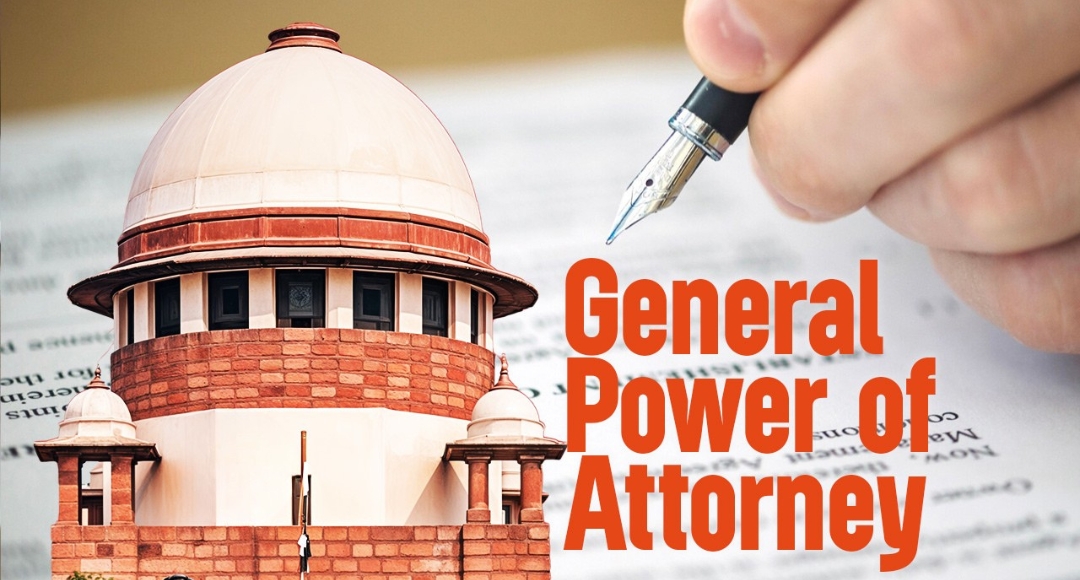Hello friends, If you are also interested in property-related matters or are planning to buy or sell a property in the future, then this news is very important for you. Recently, the Supreme Court has given an important decision, which has made it clear that no agent can get ownership of the property based on Power of Attorney and Agreement to Sell. Let us understand this matter in detail.
What was the whole matter?
This case was related to Karnataka, where the original owner Muniyappa had issued an “irrevocable” power of attorney and an unregistered agreement to sell in favor of A. Saraswati on 4 April 1986. Under this, Saraswati was given the right to look after the property and sell it. But Muniyappa died on 30 January 1997. After this, Saraswati sold this property to his son M. S. Ananthamurthy on 1 April 1998. On the other hand, Muniyappa’s legal heirs sold the same property to S. Srinivasulu on March 21, 2003. Srinivasulu later sold it to C. Roopavati, who later gifted it to her daughter J. Manjula. In 2007, J. Manjula filed a suit for a permanent injunction against Ananthamurthy, claiming that she had a legal right over the property.

Why is the Supreme Court’s decision important?
The case first went to the trial court and then to the High Court, which ruled in Manjula’s favour. Eventually, the Supreme Court also ruled in her favour, clarifying that –
- Power of attorney does not confer ownership of property – Unless it is linked to the interests of an agent, the power of attorney terminates upon the death of the owner.
- No property is transferred without a registered agreement to sell – The Supreme Court said that a mere agreement to sell cannot make someone the owner of a property unless there is a registered sale deed.
- The mere writing of the word ‘irrevocable’ does not make a power of attorney irrevocable – If the power of attorney does not have the interest of the agent attached to it, it ceases to exist with the death of the owner.
- Saraswati’s rights ceased after Muniyappa’s death – hence, the property deal executed by her was illegal.
Why did the court dismiss the appeal?
The bench of Justices J.B. Pardiwala and R. Mahadevan, while passing the judgment, said that “the sale of a property can take place only through a registered sale deed.” They have also dismissed the appeal in the matter of Suraj Lamp & Industries Pvt. Ltd. Citing the judgment of Haryana vs State of Haryana (2012), it said that – “Mere power of attorney or agreement to sell does not transfer the property. It is only a contract, which does not give ownership rights over the property.” The Supreme Court said that even if the power of attorney and agreement to sell were made together, if these documents are not registered under the Registration Act, of 1908, they cannot give anyone a valid right over the property.
What do you learn from this decision?
- If you are thinking of buying or selling a property, then it is very important to keep this decision in mind.
- Do not buy property without a registered sale deed.
- Do not sell or buy any property on the basis of power of attorney or agreement to sell only.
- Check the legal documents of the property thoroughly before buying it.
- Do not forget to take legal advice on any property-related matters.

This decision of the Supreme Court is an important message for all those who try to make property deals without following the correct legal process. If a person claims property only based on Power of Attorney and Agreement to Sell, then this claim will not be valid. This decision made it clear that only the registered sale deed determines the real owner of the property.
Disclaimer: The information given in this article is for general knowledge and information purposes only. It is not a substitute for any kind of legal advice. Before making decisions in property-related matters, consult a qualified lawyer.
Also Read:
Supreme Court Slams Overpriced Lawyers: Justice Must Be Accessible to All
Understanding the Law of Torts Bare Act: A Complete Guide
What is Tort Law: Legal Concepts and Practical Examples






